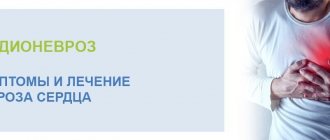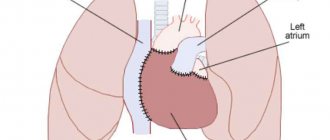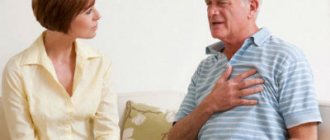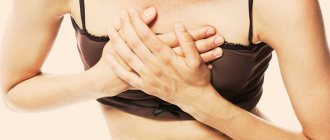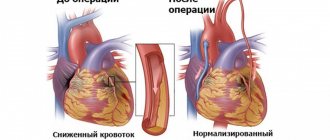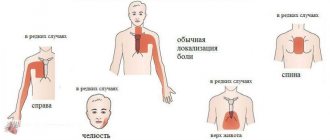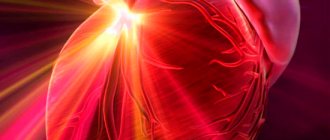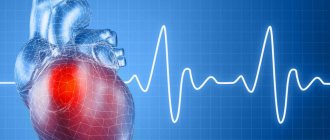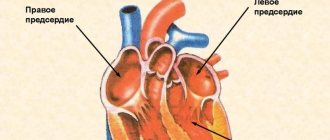Heart neurosis is one of the disorders that is characterized by pain or other discomfort in the heart area. But during examinations, no deviations from the norm in the functioning of the cardiovascular system are revealed. This is due to the psychosomatic origin of neurosis. That is, the problem is 100% psychological. And if there are no indications for heart treatment, you should consult a psychiatrist. In the international classification, the disorder has its own code F45.30 and is treated with a special technique. It is almost impossible to do this at home.
Causes of nagging pain
When the heart is pulled, this condition is most often not acute. Serious life-threatening pathologies are usually accompanied by severe pain. Causes of heaviness in the heart area:
- physical activity (in fact, the discomfort is associated with a lack of liver glycogen, but the pain may be similar to heart pain);
- stress (neurogenic cardialgia);
- pathologies of internal organs.
If the pain arose as a reaction to stress or physical activity of a certain strength (and then disappeared), the condition does not require treatment. But sometimes discomfort during exercise occurs due to serious heart problems, so it is worth undergoing an examination in any case.
VSD and heart problems
The heart reacts to what is happening around before others. That is why, when something important and exciting is about to happen, we accompany it with the phrase “I feel it in my heart.” This vital organ is protected by a whole system of barricades, but sometimes the disease penetrates inside, as, for example, in the case of VSD.
What causes chest pain in people with VSD?
With such a diagnosis, the patient, without realizing it, draws attention to his heart. Everything that happens in the area of this organ is attributed to problems with it. How could it be otherwise if these reactions determine how you feel?! People who have been diagnosed with vegetative-vascular dystonia, every time there are interruptions in the work of the heart, are afraid that their life will end. It seems to many that the pain passes right through this organ, but in fact it is localized in the chest, on the left, or at the sternum. Some patients do not think about the fact that the problems may be far from “heart-related”. If it hurts on the left side of the chest, it’s the heart. It scares. Really, what else could hurt in this area? After all, our main organ is located here, and you feel the heart beating and the blood pulsating through the veins. The work of other “mechanisms” is hidden from us. For example, the process of secreting gastric juice.
Patients diagnosed with VSD are overly attentive to their own heart. They constantly calculate the pulse, measure blood pressure, and walk around with a blood pressure monitor. These people constantly come to do ECGs. They are not against carrying out newfangled procedures, just to calm their hearts, to find out where the dog is buried. But there is no benefit from this.
The cause of pain in the heart during VSD is not organic diseases of this organ, but a disruption of the autonomic nervous system, as a result of which the hormonal system begins to react incorrectly to what is happening in the body. It is likely that the numerous ECGs that were performed before reading this article convinced you that this is not a hidden myocardial infarction or similar diseases. All of them have cardiac symptoms, but here it’s different.
Pain during VSD, what is it like?
The pain that appears in the cardiac region can be different:
- Stabbing;
- Burning;
- Aching;
- Acute;
- Pressing;
- Compressive;
- cutting;
- Blunt;
- Constant;
- Periodic.
In addition to the fact that a person experiences pain, the heart rhythm is also disturbed. This could be arrhythmia, when the pulse is erratic, or tachycardia (the organ beats too quickly). In some cases, extrasystole occurs, that is, an extraordinary contraction of an organ, or cardiac arrest when it does not contract one or more times. Such changes cause fear of death in patients.
What is characteristic of pain in the heart area during VSD?
To understand that pain is caused by VSD and is not associated with any heart disease, it is important to know its distinctive features and characteristics. They consist in the fact that pain:
- Do not occur during physical exercise. A person feels discomfort after exercise.
- Appears with movement and stops at rest. If you observe that you have just such a case, then most likely it is myositis - a disease in which muscles become inflamed, or intercostal neuralgia.
- They do not disappear after taking drugs that dilate the heart vessels. Such medications include, for example, the well-known validol or nitroglycerin.
- They weaken as a result of the action of sedatives and tranquilizers. We are talking about phenazepam, Corvalol.
- They give rise to fear of death. It increases in proportion to the increase in pain.
the symptom of VSD in the form of heart pain is not confirmed by any examinations.
As a result of such activities, it is not possible to discover anything that would cause serious concern. Maximum - blockade of the Hiss bundle branches. Author: K.M.N., Academician of the Russian Academy of Medical Sciences M.A. Bobyr
Diseases that cause heart strain
Pathological causes of nagging pain in the heart area are both dangerous and frivolous. The most common diseases accompanied by this symptom:
- neurological pathologies: osteochondrosis, herniated intervertebral discs, scoliosis (compression of the nerve ending);
- diseases of the cardiovascular system - coronary heart disease, atherosclerosis, pericarditis, aortic aneurysm, pulmonary embolism, heart rhythm disturbances;
- pathologies of the digestive system - gastritis, pancreatitis, peptic ulcer (pain often appears against the background of hunger or just eaten food);
- neurocirculatory dystonia - combined with frequent dizziness;
- neurosis - pain appears against a background of stress due to an excess of catecholamines in the blood, against the background of which oxygen starvation of tissues occurs;
- diseases of the respiratory system - pneumonia, tuberculosis.
It is impossible to make a diagnosis on your own, so if you experience nagging pain in the heart area, you should consult a doctor. A comprehensive examination and accurate diagnosis will allow you to prescribe adequate treatment to relieve and prevent the occurrence of unpleasant symptoms.
Pseudocardialgia or false pain in the heart with osteochondrosis
Cardialgia refers to all pain in the heart area until the exact disease causing it is determined. Pseudocardialgia is commonly called pain in the heart, which can have a variety of causes, and these are not heart diseases. Diseases that are accompanied by painful sensations in the heart area may include: neuralgia, neuropsychiatric disorders, vegetative-vascular dystonia, etc.
One of the diseases that most often causes false pain in the heart (pseudocardialgia) is osteochondrosis of the cervical or thoracic spine, as well as a herniated intervertebral disc. The symptoms of pseudocardialgia completely imitate pain in cardiovascular pathologies, but unlike them, they calm down when moving and intensify at rest (with real cardialgia, the opposite is true).
Osteochondrosis is a degenerative process in the intervertebral discs that affects the cervical and thoracic spine. As a result, the spinal nerves surrounding the chest are compressed and cause pain, which can be localized, including in the heart area. Hypertonicity of those muscles that are controlled by these nerves (pectoralis minor and major, intercostal muscles on the left side) also leads to increased pain. Cervical and thoracic osteochondrosis can also cause blockages of the costovertebral joints, causing pain to the patient.
The occurrence of false pain in the heart due to osteochondrosis or hernia is associated with certain movements or positions of the head and left arm (pulling to the side or moving behind the back provokes overstrain of the cervicothoracic nerve roots), at night they may appear for the first time or significantly intensify. The pain is provoked by physical activity, deep breathing, coughing or sneezing, hypothermia, and sudden movements.
There may also be an increase or decrease in reflexes in the hand, an increase or decrease in its sensitivity, tingling or goosebumps. Before heart pain occurs, a patient with osteochondrosis may experience pain in the back, along the spine, between the shoulder blades.
You can distinguish pseudocardialgia from cardiovascular pathology using an ECG (an electrocardiogram simply will not show the presence of heart disease). The diagnosis is usually confirmed by x-ray and computed tomography scan of the spinal column
After diagnosing false pain in a patient due to osteochondrosis or other pathologies of the spine, treatment by a vertebrologist is necessary. Treatment of pseudocardialgia primarily involves the treatment of osteochondrosis. Elimination of pain is ensured by taking analgesics, and manifestations of osteochondrosis are reduced by physiotherapeutic procedures.
One of the effective means is gentle manual therapy in the form of massage aimed at treating osteochondrosis, removing blockades from the spinal-costal joints, reducing the tone of the pectoral and intercostal muscles.
The massage is complemented by physiotherapy - laser treatment, phonophoresis, electrophoresis, etc. Author: K.M.N., Academician of the Russian Academy of Medical Sciences M.A. Bobyr
Diagnostics
After an in-person examination, collection of anamnesis and communication with the patient, the doctor creates an examination plan. It includes:
- pulse measurements;
- blood pressure monitoring for 7–14 days;
- auscultation of the heart;
- neurological tests;
- general blood analysis;
- electrokariogram (ECG);
- Ultrasound of the heart (EchoCG);
- X-ray of the chest organs (survey and targeted when suspicious areas are detected);
- FGDS;
- MRI or CT scan with or without contrast agent;
- endoscopy;
- X-ray of the stomach with contrast;
- X-ray diagnostics or MRI of the spine.
Such an examination will create a complete picture of the disease. Based on the data obtained, treatment is prescribed.
Treatment
Depending on the diagnosis, adequate therapy is selected. Possible treatment:
- taking analgesics;
- antibiotic therapy for tuberculosis, pericarditis, peptic ulcer, bacterial pneumonia;
- tranquilizers for neurosis;
- antacids for gastritis and peptic ulcers;
- nootropics and antispasmodics for neurocirculatory dystonia;
- surgical treatment of herniated intervertebral discs, aortic aneurysm;
- nitroglycerin for an attack of coronary heart disease;
- motherwort or valerian for stress;
- non-steroidal anti-inflammatory drugs for pericarditis.
The causes of nagging pain do not always have serious consequences. But this condition itself is unpleasant, so it is worth visiting a doctor to prescribe adequate therapy.
Read also: My heart aches
Dear patients! Remember that only a qualified doctor can make an accurate diagnosis, determine the causes and nature of the disease, and prescribe effective treatment. You can make an appointment with our specialists or call a doctor at home by calling 8-(4822)-33-00-33
Be healthy and happy!
[edit] Literature
- Phraseological dictionary of the Russian language. 4th edition, stereotypical. Edited by A. I. Molotkov. Publishing house "Russian language", 1986.
| Topic navigation | |
| Phraseologisms 1 | |
| Enmity between the blunt-pointed and pointed-pointed • Grzegorz Brzenczykiewicz • House of high culture of life • Donut hole • I have them • Kuzinatra • Father of the Russian intelligentsia • Skeleton in the closet • Elephant and Moska • Tambov wolf • Nordic, self-possessed character | |
| Politics and the Bible | Aggressively obedient majority • To be holier than the Pope • Washington regional committee • Vertical of power • Meeting without ties • Guarantor of the constitution • Talking head • Dirty elections • Spiritual bonds • Squiggle • Crocodile tears • Winged democracy • Camp Hebrew • Liberal beards • Dashing 90s • Carrot and stick method • Under control • Nigeria in the snow • New Russians • From Adam • Consigned to the dustbin of history • Parade of sovereignties • Party in power • Redistribution of property • Hanging from lanterns • Political prostitute • Political corpse • Political heavyweight • Potemkin villages • A simple Soviet man • The Fifth Estate • A strong handshake • Information leakage • Servants of the people • A glass of water • The raw materials appendage of the West • Teflon rating • The corrupting influence of the West • Trumpet call • Fig leaf • Color revolution • Civilized country • A man similar to... • Black August • Feeling of deep satisfaction • Export of democracy |
| Other | Augean stables • Amnesty of capital • Lamb in a piece of paper • Flight of capital • Without a soul • Black sheep • White salary • Got water in your mouth • Enemy votes • Popularly elected • Goal like a falcon • The trick is in the bag • Smoking gun • Women's logic • Put it in the collar • Shabby clothes • Star in shock • Golden mean • Letter Zyu • To the head analysis • Armchair strategists • As luck would have it • Canary in the mine • Painting by Repin • Apartment, car, dacha • Rat race • Climb into the bottle • Lie with bones • License to shoot journalists • Bear disease • On fish fur • Get drunk like a pig • Pull an owl onto a globe • Freudian slip • The booby of the king of heaven • From the birth of Christ • Go to the forefathers • Office plankton • Plow in the galleys • At the address • Heart to heart • King of Pop • Turning black into white • Flying like plywood over Paris • Bees against honey • Working for your uncle • Spreading cranberries • Rose-colored glasses • From the basics • With a heavy heart • Verbal intervention • Stele's reference book • Making eyes • Building communism • Drying crackers • Tablets from greed • Secrets of the universe • Fake Christmas tree decorations • Cool head, warm heart and clean hands • At a snail's pace (walking like a turtle) • Black salary |
